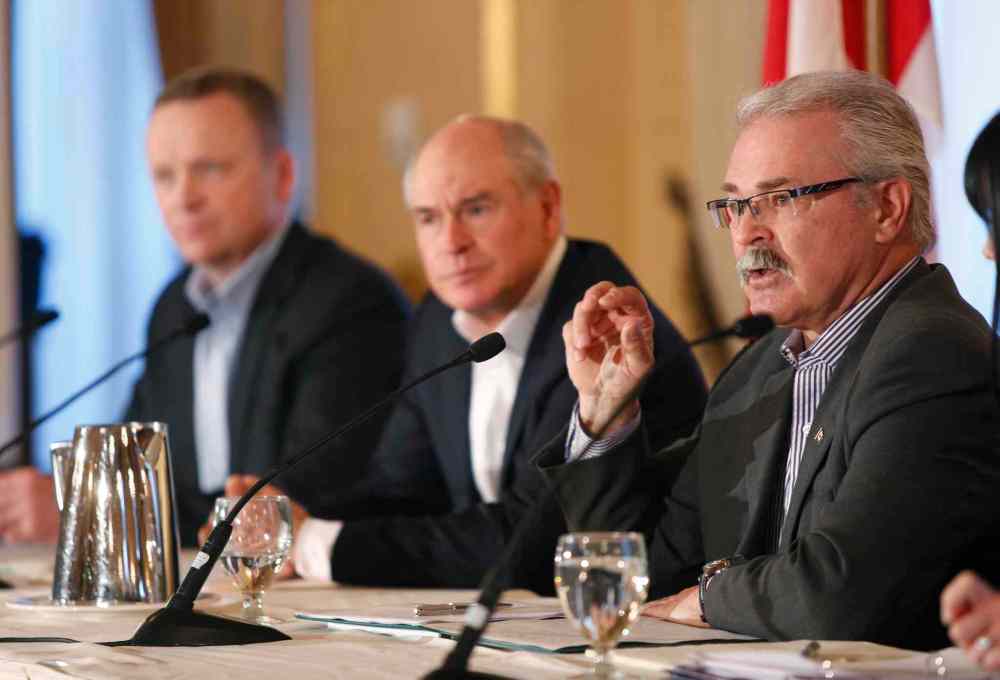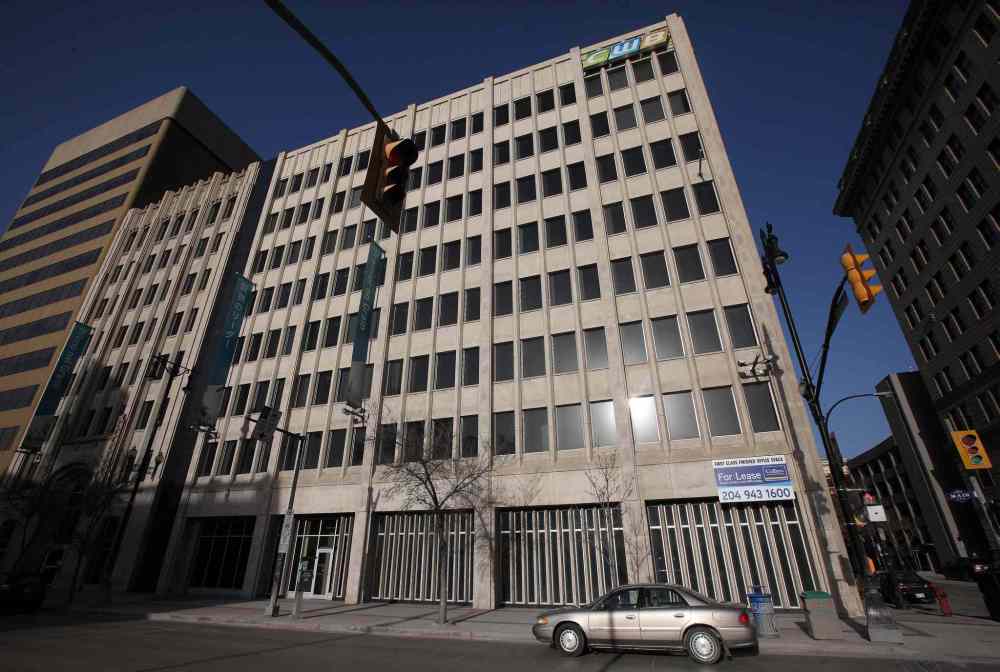U.S.-Saudi group buys 50.1 per cent of the former Canadian Wheat Board for $250 M
Advertisement
Read this article for free:
or
Already have an account? Log in here »
To continue reading, please subscribe:
Monthly Digital Subscription
$1 per week for 24 weeks*
- Enjoy unlimited reading on winnipegfreepress.com
- Read the E-Edition, our digital replica newspaper
- Access News Break, our award-winning app
- Play interactive puzzles
*Billed as $4.00 plus GST every four weeks. After 24 weeks, price increases to the regular rate of $19.00 plus GST every four weeks. Offer available to new and qualified returning subscribers only. Cancel any time.
Monthly Digital Subscription
$4.75/week*
- Enjoy unlimited reading on winnipegfreepress.com
- Read the E-Edition, our digital replica newspaper
- Access News Break, our award-winning app
- Play interactive puzzles
*Billed as $19 plus GST every four weeks. Cancel any time.
To continue reading, please subscribe:
Add Winnipeg Free Press access to your Brandon Sun subscription for only
$1 for the first 4 weeks*
*$1 will be added to your next bill. After your 4 weeks access is complete your rate will increase by $0.00 a X percent off the regular rate.
Read unlimited articles for free today:
or
Already have an account? Log in here »
Hey there, time traveller!
This article was published 16/04/2015 (3807 days ago), so information in it may no longer be current.
The former Canadian Wheat Board is now completely off the federal government’s books.
A deal was announced Wednesday for a new entity, G3 Global Grains, to acquire 50.1 per cent of the CWB for $250 million.
The plan is for the remaining 49.9 per cent of the equity in CWB to be eventually acquired by producer patrons of the CWB, who will receive $5 of equity for every tonne of grain sold to the CWB.

Agriculture Minister Gerry Ritz, who has been championing the privatization of the CWB for several years, called it a historic day.
“We expect this deal will increase export capacity, add hundreds of jobs and hundreds of millions of dollars in economic growth across Canada,” he said at the announcement in Winnipeg.
G3 Global Grain Group is a joint venture between Bunge Canada, a division of U.S.-based Bunge Ltd., and Saudi Agricultural and Livestock Investment Company (SALIC) Canada Ltd.
Bunge is the managing and majority partner.
Ritz said Industry Canada has already approved the Saudi investment. The deal, which is scheduled to close in early July, still needs approval from the Competition Bureau.
“By bringing together these great companies, we are creating a powerful new player in the western Canadian grain space, offering farmers greater choice and securing better access to international customers,” G3 president and CEO Karl Gerrand said.
Gerrand is expected to become CEO of the new entity, which will continue to be called CWB.
All of Bunge Canada’s 12-person operation in Winnipeg will move to the CWB, and its grain terminal and collection facilities in Quebec will be rolled into the new CWB entity. Bunge’s Canadian canola-crushing operations will not be affected by the transaction.
Gerrand said the CWB will continue to be headquartered in Winnipeg.
The infusion of capital will remain with CWB bolstering its efforts to continue to grow out a coast-to-coast grain-handling network that will compete with existing players such as Richardson, Cargill and Viterra/Glencore.
None of the $250 million from the deal will flow to the federal government, the former owner of the Canadian Wheat Board, and farmers will effectively have to start from scratch to reclaim their stakehold in what used to be a farmer-run marketing agency.
“This is the most massive transfer of wealth and earning power from farmers to the international trade in Canadian history,” said Anders Bruun, a spokesman for the Friends of the Canadian Wheat Board, which is pursuing a class-action suit against the federal government over the manner in which CWB assets have been privatized.
“We plan to carry forward that message in the public eye following this announcement,” he said.
‘By bringing together these great companies, we are creating a powerful new player in the western Canadian grain space, offering farmers greater choice and securing better access to international customers’
– G3 president and CEO Karl Gerrand
Manitoba NDP MP and wheat board critic Pat Martin could not hide the disgust in his voice.
“This is the biggest corporate giveaway in Canadian history,” Martin said. “They are dismantling the most successful grain-marketing company in the world and handing it over to their competitors free of charge. That’s the high price of ideology.”
It’s unclear how the scheme for farmers to acquire equity in the CWB — that has been in place since 2013 — will work.
G3 Global Grain Group will have the option to acquire the farmers’ stake after seven years, but Gerrand said for the company to be successful it needs to have a strong partnership with farmers.
Mainstream agricultural producer groups are behind the deal. Several of them attended the announcement.
Kyle Friesen, who farms near Altona and is a director of the Grain Growers of Canada, said, “Additional marketing choice is absolutely a good thing for farmers, and having the chance to have equity is a great opportunity.”
There are some who maintain the government has given away an asset for nothing.
Ritz argued the CWB assets were not worth anything at the end of the transition from its role as a single-desk marketing agency.
He said the federal government has advanced the CWB close to $300 million to clean up its books “and get it to zero.”
Ian White, CEO of CWB, said, “When the CWB came into this new environment in 2012, we identified a number of aspects of the old CWB that would no longer survive in the new environment. As we dismantled that, the government reimbursed us for those costs.”
That included cleaning up debt from heavily leveraged rail cars, a deposit made on a couple of laker vessels, the head office building on Main Street (which was recently sold), computer systems and settling up pension and severance costs.
Since then the CWB has acquired commercial debt financing for the four elevators it has under construction, as well as other assets it subsequently purchased, including a short-line railroad and Mission Terminal, which has facilities in Thunder Bay, Ont., and Saskatchewan.
One experienced financial services executive who spoke on condition his name not be used, said regardless of how the arrangement is rationalized, the assets of the former wheat board were worth something.

“I don’t know how much (they were worth), but they certainly had some equity value,” he said. “They are giving away the assets for nothing. It does not make any sense to me.”
Premier Greg Selinger said he wants assurances the company’s head office will remain in Winnipeg and the new entity will use the Port of Churchill.
Of paramount importance, Selinger said, is that it provide “maximum value” for farmers, who will be its minority shareholders.
“We have to make sure that in this new arrangement that it will be accountable to the producers,” he said.
Selinger said Winnipeg lost many jobs when the Harper government ended the wheat board sales monopoly. About 100 people are employed in the old CWB downtown office today.
He said he is encouraged about plans to possibly add another 25 positions.
Selinger told reporters it’s too early to tell if the deal will be positive for farmers.
—with files from Mia Rabson and Larry Kusch
martin.cash@freepress.mb.ca

